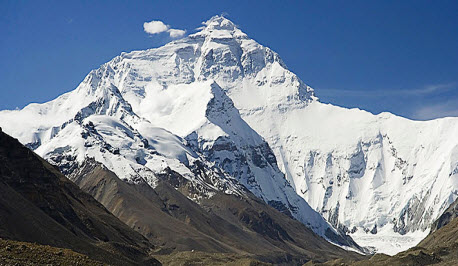Himalayan Studies Conference at Yale: A View from the World’s “Third Pole”
The Himalayan Studies Conference, being held at Yale from March 14 to 16, will explore a range of ecological, social and political challenges facing a region that divides—and connects— the two great Asian superpowers, China and India.

March 11, 2014. New Haven, Conn.—If the world’s scholars of Himalayan studies convened for a meeting 25 or 30 years ago, Mark Turin jokes, the group probably could have fit around a coffee table.
Much has changed in the last few decades, however, as people have come to recognize the critical importance of this region, sometimes called the planet’s “Third Pole” because of the enormous volumes of ice found in the Kush-Himalayan region, says Turin, program director of the Yale Himalaya Initiative.
In fact, the third Himalayan Studies Conference, being held at Yale University’s MacMillan Center from March 14 to 16, will attract more than 200 people from across the world, not including participants from the Yale community.
“What happens in the Himalaya affects 1 billion people downstream,” said Turin, who is chair and convener of the conference, which is being hosted by the Association of Nepal and Himalayan Studies. “There is a growing realization of the geopolitical challenges and opportunities around the fact that this mountain range divides — and connects — the two great Asian superpowers right now, India and China.
“All of this makes this area absolutely key — politically, culturally and ecologically.”
During the three-day conference, research scholars, health practitioners, and artists from universities and organizations worldwide will participate in 33 panels and six roundtables about a range of issues, from conservation policy and migration studies to religious movements and regional art history.
The central theme of the conference is “Communities,” with an emphasis on dialogue that pertains to communities within and across the Himalaya, regional partnerships, and practices that support Himalayan studies as an emerging field of interdisciplinary scholarship.
One entire day will be devoted to environmental issues, Turin says.
“Scholars working in the region recognize that issues of environmental change — including adaption to emerging challenges and ecosystem services — are central to sustaining livelihoods in the Himalayan region,” he said. “It’s almost unavoidable that you will engage in environmental issues now, even if you’re not environmentally trained.”
“Himalayan studies draws on so many disciplines that are well developed at Yale, and especially in the Yale School of the Environment,” said Peter Crane, Dean of F&ES and a member of the conference’s organizing committee. “Meaningful study of the Himalayas cuts across disciplines and regions, and ties together challenges that are of great ecological, social, and economic importance. We are proud to be part of an event bringing together so many experts dedicated to understanding the complexity of this region and who are committed to helping secure a better future for its diverse peoples.”
Other members of the organizing committee include Timothy Gregoire, professor of forest management at F&ES; Arjun Guneratne, professor and chair of anthropology at Macalester College in St. Paul, Minn.; Andrew Quintman, assistant professor of religious studies at Yale University; Sara Shneiderman, assistant professor of anthropology and South Asian studies at Yale; and Kalyanakrishnan Sivaramakrishnan, professor of anthropology and School of the Environment at Yale.